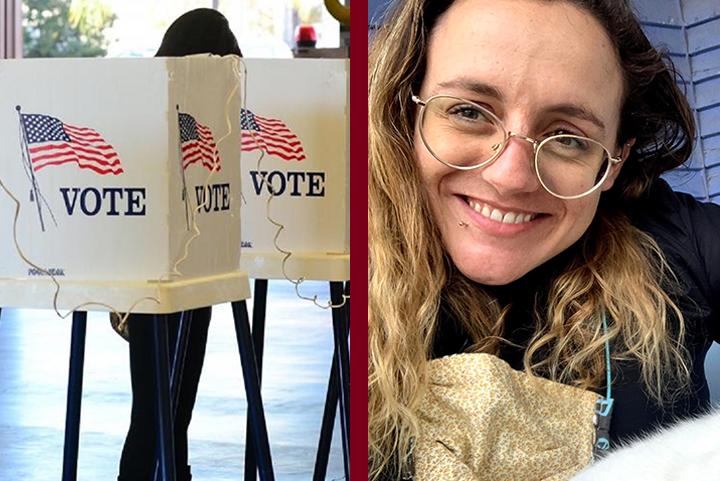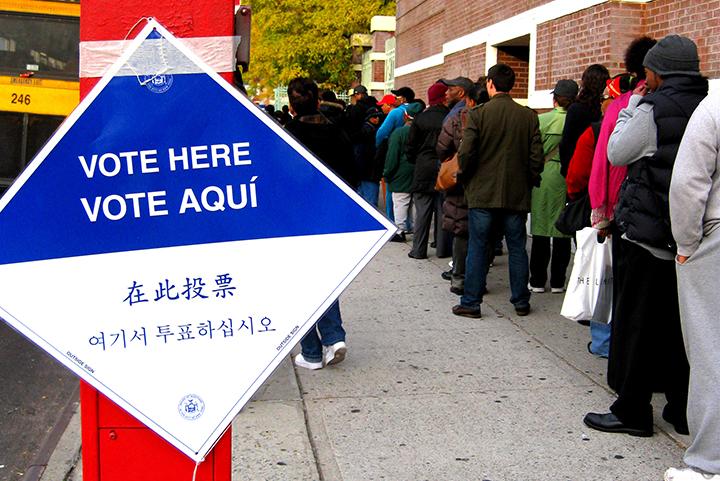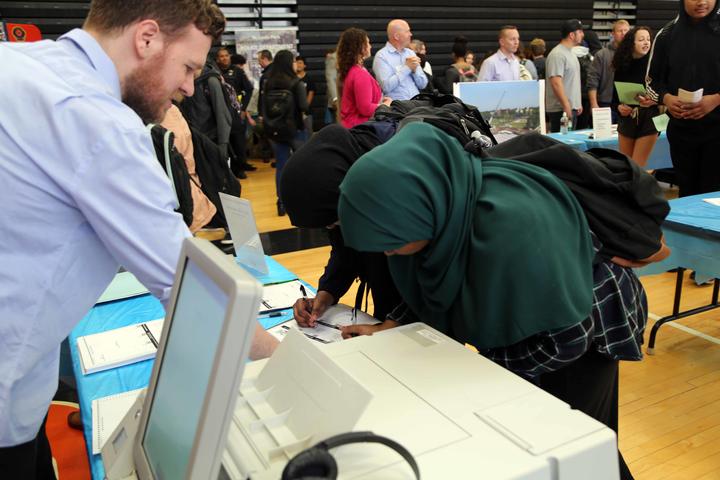America’s election system faces an urgent need for professionals who are well trained in the latest technology and techniques in the field and well-versed in the legal and policy challenges facing our voting system. The Humphrey School of Public Affairs is responding to this widespread need with a pioneering online program to prepare professionals in election administration.
Flexible Online Training
The Certificate in Election Administration is designed with maximum flexibility for those experienced individuals already managing state and local election offices, as well as those seeking to become part of the next generation of creative and committed leaders. Whether you are currently working in or considering a career in elections, this rigorous and relevant online 12-credit program will prepare you for advancement in the profession of election administration. Courses are taught by prominent leaders in election administration and are accessible online 24 hours a day from anywhere in the world.
Meeting a National Need
This first-of-its-kind program in the U.S. is in direct response to the 2014 Presidential Commission on Election Administration report, which urged universities to integrate election administration into their curriculum in a concerted effort to expand professional expertise in the field. The program is presented in an accessible and stimulating online format that allows students to continue with their current employment while working toward a University certificate.
What You Will Gain
- Knowledge of the laws, technology, and debates shaping elections today
- Ability to respond effectively to the rapidly changing landscape of elections
- Career-enhancing connections to peers and leaders in the election field
- Academic credential from the Humphrey School of Public Affairs, one of the country's top professional public policy schools.
Certificate Options
- Post-baccalaureate (bachelor’s degree required)
- Undergraduate (no bachelor’s degree required; one year of work experience in election administration or related field or 45 college credits)
View Certificate in Election Administration application requirements
Conferences
Instructors
Instructors in the CEA program are prominent national experts in the field of elections, bringing an incredible depth of knowledge and real world experience to their classes. Current and past instructors include:
- Doug Chapin, Director - Election Research, Fors Marsh Group
- Dana Chisnell, Acting Executive Director for Customer Experience, U.S. Dept. of Homeland Security
- Judd Choate, Director of Elections, Colorado Department of State
- Lawrence Jacobs, Professor, Humphrey School of Public Affairs, University of Minnesota
- Neal Kelley, Registrar of Voters, Orange County, California (retired)
- Matt Masterson, Director of Information Integrity, Microsoft
- Jennifer Morrell, Partner, The Elections Group
- Astrid Ochoa, Principal & Founder, Ochoa Consulting Partners, LLC
- Tammy Patrick, Chief Executive Officer for Programs, The Election Center
- Whitney Quesenbery, Director and Co-Founder, Center for Civic Design
- Gina Roberts, Voter Education Director, Citizens Clean Elections Commission
- Maurice Turner, Technical Policy Lead, Tik Tok and Cybersecurity Policy Expert
- Amy Wilson, former Training Coordinator, Colorado Secretary of State’s Office
Curriculum
The fully online Certificate in Election Administration requires 12 semester credits, including three core courses and five elective credits.
Core Courses (Required)
PA 3969 / PA 5971 – Survey of Election Administration (3 cr.)
Fall 2023, Fall 2024
Comprehensive course on the general building blocks of election administration from voter registration to recounts. Students will learn how the three levels of government interact to manage different aspects of the election process; recognize the key debates and tensions in election policy; and identify their impacts on election administration.
PA 3972 / PA 5972 – Elections and the Law (2 cr.)
Spring 2024, Spring 2025
A thorough examination of election laws at the federal, state, and local level and how they guide the conduct of elections by officials and voters alike.
PA 3973 / PA 5973 – Strategic Management of Election Administration (2 cr.)
Fall 2023, Fall 2024
Strategic management for election administrators in the political environment. This course covers the distinct phases and hurdles of the policy process and skills for election officials to enact new policy.
Elective Courses (5 or more credits required)
PA 3975 / PA 5975 – Election Design (2 cr.)
Spring 2025
An innovative course on design principles and how they are used in election administration. Through small, weekly assignments, students learn and practice new skills in plain language, design, and usability with real election materials.
PA 3976 / PA 5976 – Voter Outreach and Participation (1 cr.)
Spring 2024, Fall 2024
Why do some voters turnout while others don’t? This course investigates the patterns and history of voter participation and practical steps to increase voter turnout.
PA 3982 / PA 5982 – Data Analysis for Election Administration (2 cr.)
Fall 2023, Spring 2025
This course highlights the importance of evidence-based election administration through the collection and analysis of quantitative data to solve problems and identify opportunities for improvement. Pre-election forecasting for planning purposes as well as post-election auditing of election results are emphasized.
PA 3983 / PA 5983 – Introduction to Election Security (1 cr.)
Summer 2024
This course examines the history of cyberattacks on the United States and the American election system, with special attention to the 2016 election cycle. Students will explore the types of cybersecurity threats that exist and strategies to protect against them.
PA 3984 / PA 5984 – Elections Security: How to Protect America's Elections (2 cr.)
Spring 2024, Spring 2025
This course provides elections professionals with tools and best practices to help protect their election technology, guard against influence efforts, and assure public confidence in election outcomes.
PA 3985 / PA 5985 – Physical Election Security (2 cr.)
Fall 2023, Fall 2024
This course provides a deeper understanding of the current security context and best practices and processes for physically safeguarding elections based on 2016 and 2020. Students learn the difference between physical and cyber threats to U.S. systems; tangible steps to protect election offices and their equipment; the use of audits to ensure the accuracy of elections; the integration of security into vendor relationships; and the connection between physical election security and citizen trust in elections.
Admission criteria and materials
Post-baccalaureate certificate (bachelor’s degree required):
- Resume
- Personal Statement (in 500 words or fewer, double spaced, discuss your educational and professional experiences and goals related to election administration. )
- College transcripts
- TOEFL/IELTS scores (required for most non-native English speakers)
Apply now to the post-baccalaureate certificate
Undergraduate certificate (No bachelor’s degree required. 1 year of work experience in election administration or related field or 45 college credits):
- Resume
- Personal Statement (in 500 words or fewer, double spaced, discuss your educational and professional experiences and goals related to election administration. )
- College transcripts (if applicable)
- TOEFL/IELTS scores (required for most non-native English speakers)
Apply now to the undergraduate certificate
Questions about the application process can be directed to [email protected].
Tuition and Fees
The program cost is based on tuition rate per credit. The full program is 12 credits. All students pay the resident rate, regardless of residency status, because it is an online program.
Undergraduate tuition rate: $557.55 per credit.
Graduate tuition rate: $1,059 per credit.
Academic Records Fee: One time fee assessed to support the development and maintenance of the academic record including official document production.
$150.00 - one time (new degree-seeking and certificate students)
$75.00 - one time (non-degree students)
Humphrey School Collegiate fee (per semester)
$250.00 - All students, 6 or more credits
$125.00 - All students, fewer than 6 credits
If you are a University of Minnesota student currently enrolled in a different degree program and taking CEA courses, please check with your degree program for your tuition rate.
Financial Aid, Group Discount, Scholarships
Group Discount
Students do not need to be enrolled in the same courses or at the same level in order to be eligible for the discount.
4 - 9 students: 20% tuition discount
10+ students: 30% tuition discount
Scholarships
More information to come.
Financial Aid
Credit certificate students are not eligible for federal financial aid.
Questions? Please email [email protected].





